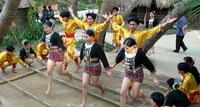| The spirit of a festival |
It is its cultural connotation that has been sustaining the Dragon Boat Festival for more than 2,000 years. And it is a range of customs with local flavor that have carried the cultural connotation for that many years. They include dragon boat race, eating pyramid-shaped glutinous rice dumplings, hanging pyramid-shaped cloth decorations and so on. Without these traditions, the festival would not have continued to be observed until today. Behind the call for the restoration of traditional culture in recent years is the anxiety that many people feel for the possible loss of cultural connotations supporting our festivals. As far as the Dragon Boat Festival is concerned, the angst, for some, comes from the inscription of the same festival in the Republic of Korea (ROK) on the world cultural heritage list. Many felt crestfallen when the United Nations Educational, Scientific and Cultural Organisation (UNESCO) listed Gangneung Danoje Festival (ROK's version of Dragon Boat Festival) as intangible world cultural heritage in 2005. They considered it a shame for a traditional Chinese festival to be registered by ROK for UN recognition. Therein lies the context for the protection and restoration of the Dragon Boat Festival tradition. Only last year, this festival was designated as an official national holiday. Hubei province, where the festival originated, applied to UNESCO for listing the festival as intangible cultural heritage early this week. It goes without saying that recognition as intangible world cultural heritage would not make much difference to continuing with a traditional festival or custom. It is unrealistic, and even ridiculous, to expect that such recognition will revive people's interest in a traditional festival if it has lost its appeal. What makes a difference is the activity in the name of a festival to attract investment to the local economy. To that extent, a UNESCO title would be seen as an achievement for the local officials who have been working for it. Often, traditional cultural festivals and customs are invested with irrelevant meanings and elements. These have actually diluted their cultural context. When a wide range of commercial activities in the name of a traditional festival or a custom overshadows its cultural conno-tation, it will undoubtedly lose its cultural appeal for people who observe it. It is quite natural for practices associated with a traditional festival to change in course of time. But the festival itself will never lose its appeal as long as people keep its cultural connotation in mind. So, by all means, observe a traditional festival or custom as it is. Let it remind us of what gave rise to it. Forget about a UNESCO certification of the festival as intangible cultural heritage. Relish the pyramid-shaped glutinous rice dumplings. Join a dragon boat race, at least as an onlooker. And, if you are a parent, tell your children that an ancient poet drowned himself over 2,000 years ago after learning about the downfall of his country. That may be the best way to carry forward the spirit of this festival. |
|

